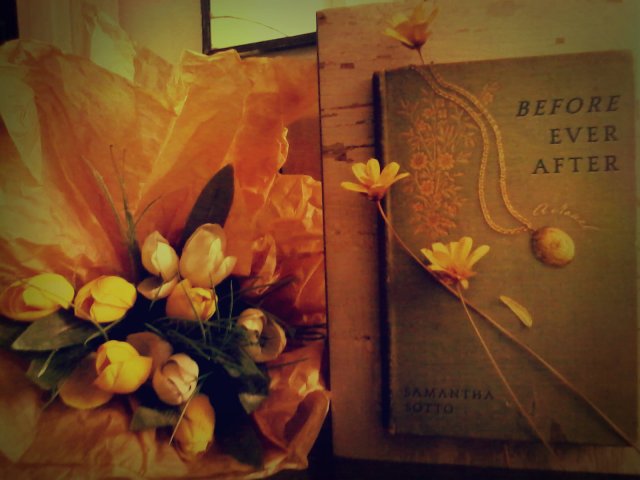Doomsday is upon us! (Read: Happy Valentines, ya’ll.)
I bought that bouquet of flowers for someone really special—myself. (Because I can and because I am quite possibly the most conceited forever-alone person in my side of the world.) Also, I picked up and read Samantha Sotto’s Before Ever After, which is an almost-perfect book that nearly drove me insane in utter frustration and self-discontent.
One of the hardest parts of book-blogging is writing reviews about books that are so wonderfully-written they literally take the breath and the words out of you. How does one go about putting an extraordinary reading experience into words? How does one accurately translate the perfection of being enamored, won-over and heartbroken into a couple of paragraphs? How does one begin to describe a book that has meant so many things from beginning to end? It’s like coming across this cheesy, infamous question in every slumbook: Define Love. There will never be enough metaphors and adjectives. We get intimidated and so we accept the fact that our words wouldn’t do our emotions and opinions justice. We try and then we fail miserably. Hence, we procrastinate and we end up not writing—or saying—anything at all.
I felt this way for a long time after reading Before Ever After. There are so many things I’d like to say about how brilliant it is but I simply don’t know where to begin. The book is so great it literally rendered me incoherent with all the emotions it made me feel. I can barely count the number of times I attempted to begin my review only to end up zoning out and staring at the blinking cursor on the screen, groping for words, gibberish, anything. But alas, nada; my mind keeps on coming back instead to the book’s beautiful passages such as these:
Shelley had first come to the conclusion that age was a sound when she went hunting for a place after she first moved to London. Most of the places she had seen were white shoe boxes that reeked of fresh paint and lemon air freshener. This was, after all, the easiest way to make a place feel shiny and new. But all the Lysol in the world could never change how a home sounded. New places snapped crackled and popped. The flick of a light switch was crisper, the toilet flushed with a fury, and the drawers slid open with the whoosh of an Olympic bobsledding team. New apartments were like yapping puppies in a pet store, jumping over one another to be picked. Older places were more restrained. Each sound they make was thoughtful and deliberate: the slow, echoing plops of a leaky faucet, the falsetto creak of a floor plank, the soft sigh of a breeze through a jammed window.
If there’s one significant thing Samantha Sotto has proven with her book, it’s the fact that a romantic novel can both be SENSATIONAL and INTELLIGENT. The depth of wisdom in this book is crazy—the insights were profound, the storytelling, eloquent, rich, stirring. Even in the height of events, the book unfailingly paints a larger picture of what’s happening in each character’s mind. Just look at this bit of brilliance on one of the pivotal points in the story:
A friend had told Maximus once that his entire life had flashed before him when his horse threw him, and he thought he was going to die. Maximus now knew that his friend was a liar. Death was not as kind as his friends had led him to believe. What Maximus saw as the wave cooked him from the inside was not the life that he had lived—it was the life he would not have.
Or this solemn snippet from a letter towards the end of the book:
But believe me when I tell you that it is a legacy that I wish you did not have to inherit. I kept my lifetimes from you so that I would not deprive you of your own. I wanted you to have your boring summer afternoons, your teenage angst, your days when your life’s meaning depended solely on whether you scored a goal in soccer. I wished the mundane for you, the small and unnoticed, the simple memories painted in black and white. The gray I lived in was too cruel to share.
Needless to say, I cried buckets alongside the soundtrack of my heart breaking in the background when the book ended. It’s almost perfect, it’s painful. It’s a fantastic way to hurt, you guys. The book says,
There are many ways to live forever.








http://opinion.inquirer.net/46835/searching-for-the-girl-who-reads
I don’t really celebrate Valentine’s Day but for what it’s worth, I hope you have a great day today. 🙂
Great Read! Thanks for the heads up! I just DM-ed you on goodreads re: our book swap for this month. 🙂